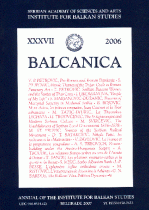The Balkans’ New Political Dynamics
The Balkans’ New Political Dynamics
Author(s): Gordon N. BardosSubject(s): Politics / Political Sciences
Published by: Balkanološki institut - Srpska akademija nauka i umetnosti
Keywords: The Balkans; Serbia; Montenegro; Kosovo; independence; political situation;
Summary/Abstract: The Balkans is currently going through its most profound period of change since Slobodan Milošević’s overthrow in October 2000. Montenegro has declared its independence from the state union of Serbia and Montenegro; the Kosovo future status talks are in their final stages and by all indications will suggest some form of independence for the Serbian province; new governments are in place in Bosnia-Herzegovina and Macedonia; while the results of Serbia’s January 2007 elections suggest that Serbian politics will be unstable for the foreseeable future. All of this is occurring at a time when two of the pillars promoting stability in the Balkans – a substantial U.S. military presence and the foreseeable prospect of EU accession for the countries of the region – are being withdrawn. Meanwhile, a new variable is being introduced into the strategic equation in the region – the return of Russia as a serious player. As a result of all of these new developments, without a more serious commitment to the region from both Washington and Brussels over the next few years, there is a serious likelihood that the democratic and economic transitions in the region will suffer serious setbacks or delays.
Journal: BALCANICA
- Issue Year: 2006
- Issue No: 37
- Page Range: 295-305
- Page Count: 12
- Language: English

